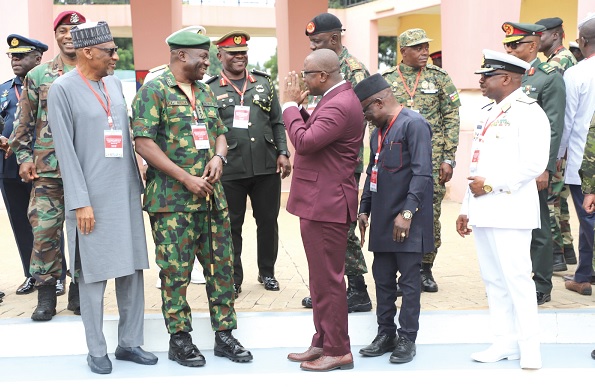
Be careful what you wish for…
Following the spate of coups in the sub-region, with Niger being the latest casualty, it has become almost trendy on social media for some to romanticise the idea of a military coup in this country in relation to issues on governance and corruption.
Advertisement
I am quite willing to bet that most, if not all, of such romantics have never experienced a coup in this country
Why coups?
There is a certain insistence that coups are always solely or even mainly, the by-products of corruption and poor governance and, therefore, the solution to ending corruption.
The notion, against all the evidence, that those who do not support a coup necessarily support corruption and misgovernance is the product of an unfortunate binary perception that debases public debate.
It is easy for people to write off the realities of our past military governments by insisting that those who recall those dark days are either exaggerating or simply being alarmist in being apologists of the status quo of corruption and bad governance.
When I asked an ardent Nkrumahist friend, who says coups happen due to corruption, whether Nkrumah’s government was corrupt, he began to stutter and insist that the 1966 coup was a CIA-inspired coup to curb Nkrumah’s Pan-Africanist ideals.
I could only smile. He then argued that the outpour of public support for the coupists in Niger, Burkina Faso, Guinea and Mali was significant.
Again, I reminded him that there were celebrations in Ghana when Osagyefo was overthrown.
Street celebrations in themselves, therefore, are not the all-be-all.
Interestingly, one of Acheampong’s reasons he gave for the 1972 coup was the complaint that even the few amenities that the military enjoyed under Nkrumah were taken away by the Busia government.
In Niger, according to political watchers, public anger over economic despondency, France’s stranglehold over the country’s uranium resources, ethnicity issues (Bazoum is from Niger’s ethnic Arab minority, whilst the military top brass are from an ethnic majority and see him as an outsider) and a failure to tame insurgents, all combined to give the soldiers the opportunity and cover to ride into town.
Of course, it would be absurd to argue that corruption or misgovernance have no part to play in military uprisings.
But to heap every coup as the result of corruption is to risk misdiagnosing the reality, because the ensuing logic of such an argument then would be that countries that have not experienced military coups have been well-governed, which would be a ridiculous argument.
A bundle of factors almost always provides the gun powder for military adventurism.
Consequences
In the short-term, coups may give a burst of excitement, particularly to the masses, as we see politicians thrown into jail.
But when the euphoria dies down, the effects trickle down to all of us, including clamping down on free speech, whether via traditional or social media platforms, as well as on free movement through dawn-to-dusk curfews.
Over the years, our assorted bands of self-proclaimed liberators, redeemers and revolutionaries took to ridding the nation of corruption threats and the sheer use of brutish force.
But the evidence is that military rule does nothing to stem corruption.
If anything, they actually make it worse and eventually return to the status quo that they have pledged to eradicate.
Indeed, the irony of it all is that under military governments, the airing of incidents of corruption and misgovernance is a risky sport, because there are no opposition parties or a free press to do so, and all other pressure groups and institutions are usually castrated.
Some of the harshest critics of government in this country who exercise their free speech will be unable to exercise those rights in a military dispensation, as Chairman Rawlings used to boom, ‘who born dog?’’
There is nothing cute or romantic about military coups.
In the aftermath of the 1979 and 1981 coups, it was not only the top brass of society who got arrested, jailed or mistreated one way or another.
Ordinary citizens, many of whom had earlier cheered the coupists and urged them to “let the blood flow’’ also bore the brutal brunt for petty infractions real or imagined.
In particular, workers and university students, a core base of the Provisional National Defence Council (PNDC) in 1982 found themselves on a collision course with the Rawlings government after 1983, when IMF conditionalities began to bite with the withdrawal of subsidies and mass retrenchment of the public sector workforce.
Better governance
Of course, we must demand better governance because we deserve that and more.
In doing so, we need not rely on a group of gun-toting adventurous to do so on our behalf, for their interests in almost all cases do not align with ours.
With every democracy, protests, petitions, resistance, lobbying, a powerful and principled media and others are all powerful tools to ensure accountability that we must and can deploy.
Fortunately, in this country, we do not have a culture of silence.
Civilian systems are not perfect.
They may be cumbersome and irritating at times but on any day, they are better than the rule by the gun.
We must be careful what we wish for as an alternative to our governance challenges, lest we get it.
Rodney Nkrumah-Boateng,
Head, Communications & Public Affairs Unit,
Ministry of Energy,
Accra.
E-mail: [email protected]



